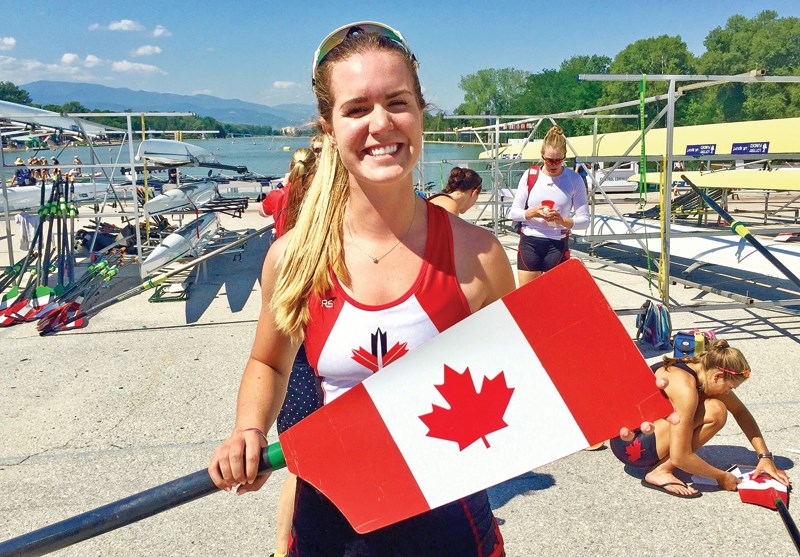After crossing the finish line the timer read 06:00.130.
A microsecond or so more than six minutes – and at that, Team Canada had set a new world record for U23 rowing.
It was during the heat round July 20 at the 2017 World Rowing Under 23 Championships in Plovdiv, Bulgaria, when the nine women – eight rowers and the coxswain – made their mark for the Canadian women’s rowing eight team.
“It was the right mentality, it was the perfect conditions, and we just stuck to our race plan, trusted our coxswain, and it was really successful. That was a great feeling to have going into our final,” explains Team Canada rower Madison Mailey.
Oh, right – and Team Canada also ended up taking home the gold at the U23 finals a few days later as well.
The Under-23 Championships ran from July 19 to 23, with eight nations competing in the women’s rowing eight division.
After coming off the high from the heat round, Team Canada didn’t let their newly minted rowing record distract them from the main prize.
The team stuck to what made them great: trusting the process.
“I think we just thought we had to race the same way we raced on Friday and not try to get into a big mental game. Just focus on us,” Mailey says. “We didn’t change anything. We knew that we didn’t always have a fast start and so we just knew that we trusted in our boat and we knew that we could bring it up.”
Rewind a few months to when the Canadian women’s rowing eight team was still training together and you’d likely see a team unaware of the successes they were about to have, but striving for them nonetheless.
A five-week training session in London, Ont., was accompanied by a week of training in Greece, where the team was flown in order to acclimatize to the weather and air quality before heading to Bulgaria for the rowing championships.
Mailey says that during training in London the team would row a combined 30 kilometres per day.
“It was a lot more than we were used to,” she says. “It was quite a transition.”
The challenging training transition paid off, helping the team transform their hard work into a final’s win – and a world record.
Since Team Canada won their heat, they automatically had a place in the final race July 23.
Also rowing in the final championship race was the U.S., Russia, Germany, Denmark, and the U.K.
The Canadian team got off to a slow start when the race started, arriving in third place by the 500-metre mark, trailing the U.S. and Russian teams that got off to a faster first run.
“It’s quite a nerve-racking experience – going, sitting, at the start line and understanding you have around 260 strokes in this race and you have to make sure every single one of those strokes you’re putting everything on the line,” Mailey says.
The team couldn’t let their exhaustion set in and instead had to trust that their muscle memory and faith in the process would see them through, Mailey adds.
At the 1,000-metre mark the U.S. climbed to the No. 1 spot and Canada moved into second.
The two North American nations battled it out for another 500 metres until a late U.S. error gave Team Canada the advantage to overtake them.
A rower in the second seat on Team U.S.A fell off her seat, an error that unbalanced the boat and crucially threw the team out of rhythm.
“She had that little blimp and in that moment we took about two or three seats and then we just kept going for it,” Mailey says. “We just keep our head down, follow what the stern pair’s doing, and hopefully following their long steady rhythm, and that’s exactly what we did.”
A wide berth opened, and Team Canada finished with an impressive time of 06:09.890, beating the second-place finishing U.S. team by almost seven seconds to take home the gold medal.
Mailey was naturally thrilled at her team’s result and the amazing learning experience she said it provided her – skills she plans to take back to Northeastern University in Boston where she competes in NCAA rowing for the women’s team.
But she first hit the water and paddled the oars on the North Shore.
“I started rowing in Grade 8 and I started rowing with the Collingwood team,” she explained. “We trained out of Deep Cove.”
From there Mailey became the captain for the Collingwood team before taking her ambitions to a national stage.
She tried out for Canada’ junior national rowing team and started training out of Burnaby Lake, participating in such high-stakes rowing competitions as the CanAmMex Regatta – a race between America, Mexico and Canada – in her last two years of high school.
Mailey speaks highly of the team aspects of rowing. Referring to the heat round in Bulgaria, she says the team wasn’t focused on breaking a rowing record.
“We weren’t thinking about the results, we were thinking about the process and thinking about how much training we had done together.”
It was only after the race, in fact, when the team was cooling down that their coach excitedly announced that they’d broke the world record.
Mailey plans to go back to university in the fall and have another stellar rowing season, but her ultimate goal is to qualify for the 2020 Olympics in Tokyo.
“That would be incredible,” she says.
Asked what it was like getting that rowing record during the heat round, especially seeing as the U.S. was close to setting the record as well -- they landed a time of 06:00.350 compared to Team Canada’s record-setting 06:00.130 -- Mailey explains that the sport all comes down to microseconds.
“It was very close -- but that’s rowing.”



